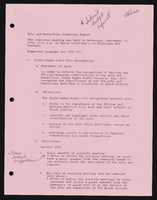Search the Special Collections and Archives Portal
Search Results

Transcript of interview with Alfred "Al" Isola by Stephen Kalish, March 15, 1976
Date
Archival Collection
Description
On March 15, 1976, Stephen Kalish interviewed Alfred “Al” Isola (born August 3rd, 1917 in Oakland, California) in his office about his garbage company and early Southern Nevada. The two discuss Las Vegas’ lack of a unified garbage system and how dumping sites have had to adjust their practices in order to limit their impact on pollution. Isola also explains the different disposal protocols for wet and dry trash. On the second tape of the interview, an unidentified woman enters the conversation.
Text

Transcript of interview with Dr. Nell Jeffers by Yatska Aldarondo, February 26, 1980
Date
Archival Collection
Description
On February 26, 1980, Yatska Aldarondo interviewed psychiatric counselor, Dr. Nell Jeffers (born in Houston Texas) about her life in Las Vegas, Nevada. Dr. Jeffers discusses her work as the student and faculty counselor at the University of Nevada, Las Vegas. The two also discuss some of the hardships of living in a desert, as well Dr. Jeffers’ plans to move into private psychiatric practice.
Text

Transcript of interview with Paul Bowerman by Frances Harelik, March 5, 1976
Date
Archival Collection
Description
Text
Southern Nevada Historical Society Photograph Collection on Basic Magnesium, Inc.
Identifier
Abstract
The Southern Nevada Historical Society Photograph Collection on Basic Magnesium, Inc. contains photographs of the construction of Basic Magnesium Inc.'s plants and buildings from 1941 to 1942. The photographs primarily depict aerial views of the plant site and various buildings, including the administration building, tent camp, chlorination buildings, electrolysis facilities, electrical distribution systems, and warehouses. The photographs also depict Lake Mead and the early buildings in Henderson, Nevada.
Archival Collection

Alpha Kappa Alpha Sorority, Theta Theta Omega Chapter arts and humanities committee report
Date
Archival Collection
Description
From the Alpha Kappa Alpha Sorority, Incorporated, Theta Theta Omega Chapter Records (MS-01014) -- Chapter records file.
Text
Geraldine Sharpe and Dianna Menzel oral history interview
Identifier
Abstract
Oral history interview with Geraldine Sharpe and Dianna Menzel conducted by Claytee D. White on May 23, 2016 for the Boyer Early Las Vegas Oral History Project. In the interview, Sharpe describes her early memories of Las Vegas, Nevada beginning in the 1930s while her daughter, Dianna Menzel, clarifies and adds details. Sharpe recalls moving to St. Thomas, Nevada in 1930, her early life in the area, and memories of family members in Alamo, Nevada. Sharpe then describes moving to Las Vegas after St. Thomas was flooded in the 1930s, her education, and people and locations in her local community. Other subjects Sharpe talks about include housing conditions and recreational activities during the 1930s and 1940s, the Helldorado parades, the Las Vegas Mormon community, and life in Las Vegas during World War II.
Archival Collection
Julian Eusebio oral history interview
Identifier
Abstract
Oral history interview with Julian Eusebio conducted by Cecilia Winchell, Jerwin Tiu, and Stefani Evans on June 01, 2022 for the Reflections: the Las Vegas Asian American and Pacific Islander Oral History Project. In this interview, Eusebio discusses his childhood in the Philippines countryside, helping his parents farm and harvest rice. After moving to Manila for college, Eusebio studied architecture and illustrated for comics and magazines. After moving to Los Angeles, California, Eusebio started a construction business, doing landscapes and constructing swimming pools for celebrities such as Michael Jackson. In 1992, he opened another branch in Las Vegas, Nevada. After retiring in 2010, Eusebio took up painting again and cites his favorite artists as Norman Rockwell and Rembrandt. In the remainder of the interview, he discusses his drawing process and how he started showing his artwork throughout the Las Vegas Clark County Library District.
Archival Collection
Alice Key oral history interview
Identifier
Abstract
Oral history interview with Alice Key conducted by Claytee D. White, with Joyce Moore and two unidentified individuals on November 11, 2004 for the African Americans in Las Vegas: A Collaborative Oral History Project. In this informal interview, Key talks about her early education, sharing anecdotes along with more serious comments. She continues talking about her early activism, beginning with housing discrimination in Los Angeles, California, the work of President Lyndon Johnson on equal rights, her work on the Clark County Nevada Economic Opportunity Board, and the issue of hiring Black front-of-house employees at the casinos and hotels. She continues chatting about families who own or owned casinos in Las Vegas, different church leaders in the city, and ends talking about early Black entertainers, including Dorothy Dandridge and the Barry Brothers and her own experiences as a dancer.
Archival Collection
Wendell Phillips Williams oral history interview
Identifier
Abstract
Oral history interview with Wendell Phillips Williams conducted by Claytee D. White on October 4, 2021 for African Americans in Las Vegas: a Collaborative Oral History Project.
Wendell Phillips Williams discusses his childhood and education in Louisiana before moving to Las Vegas in 1977. Williams talks of his time teaching for the Clark County School District (CCSD), his radio program "Straight Talk" on KCEP's Power 88.1 radio station, the Crystal Apple Award he received as an educator from CCSD, and how he started the now-longest standing Martin Luther King Jr. parade in the United States. Williams shares his passion for Black history and education as well as the bills he championed as a Nevada State Assemblyman from 1987-2001. He also discusses the historical details of how Madison Elementary School was rebuilt and became the Wendell Phillips Williams Elementary School in 2002.
Archival Collection
Reports, surveys, and chronological files, 1884-2005
Level of Description
Scope and Contents
Materials contain reports, surveys, and chronological files from 1884 to 2005. The series includes the non-visual materials from the North Las Vegas Bicentennial Committee and Advisory Board for Kiel Ranch. The series includes reports on the property, site maps, surveys, and newspaper clippings about the property and project's status.
Archival Collection
Collection Name: Kiel Ranch Preservation Committee Records
Box/Folder: N/A
Archival Component
